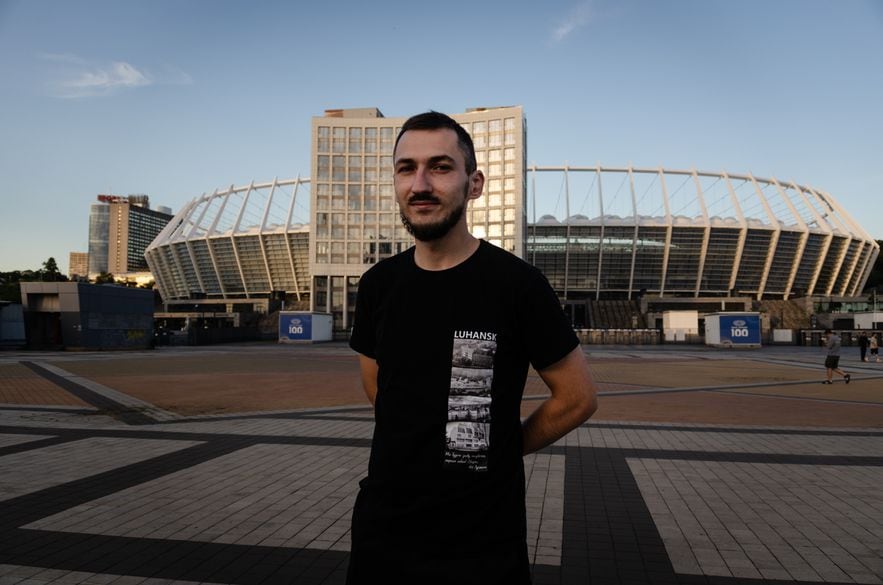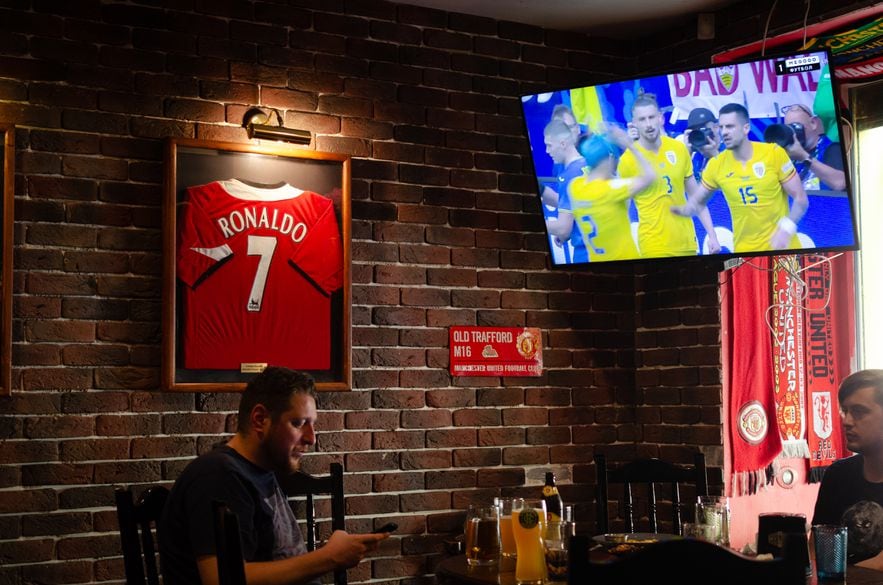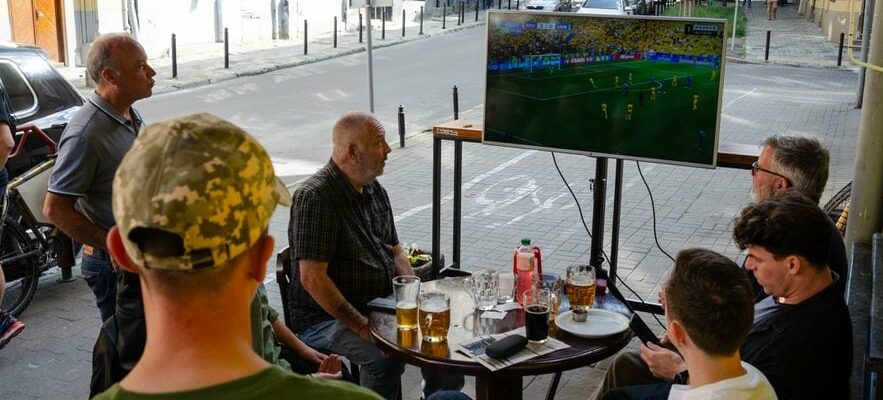Vitali Ovtcharenko remembers Euro 2012 football (organized in Ukraine and Poland) as if it were yesterday. It seems so far away though… This Ukrainian soldier was then in Donetsk, “the city of a million roses”, where several matches took place. In the Donbass Arena, inaugurated by Beyoncé three years earlier, Spain eliminated France in the quarter-finals. “It was a big football celebration. For our city, for our country, it was the symbol that Western Europe trusted us and was no longer afraid of Eastern Europe.” says Vitali by telephone. This ultra from Shakhtar Donetsk, the local team, then put aside rivalries with other Ukrainian clubs to support the national team in a sort of sacred union behind the blue and yellow flag.
“We chose Ukraine without hesitation”
Two years later, in February 2014, Donetsk is no longer at the heart of European football, but at the heart of a war which has not yet spoken its name with Russia. While the revolution triumphs on Maidan Square in kyiv with the dismissal of the corrupt pro-Russian president Viktor Yanukovych, in the Donbass pro and anti-revolution demonstrators oppose each other. The latter were soon armed and supported by Moscow. But, with their experience of fighting against other fans or the police, the ultras organized themselves to protect the pro-Ukrainian demonstrators. “We, the ultras, chose Ukraine without hesitation,” continues Vitali, then a resident of Donetsk, a Russian-speaking city. “We had attended lots of matches in the west of Ukraine, where we spoke Russian to each other without it being the slightest problem. So we knew that the Russian propaganda according to which Russian speakers were in danger was nonsense. bullshit. Everyone, Russian-speaking and Ukrainian-speaking, was together behind the Ukrainian selection!”
In the streets of Lviv, Ukrainian supporters and a soldier watch the national team play at Euro 2024.
© / Clara Marchaud
He continues: “When titouchkis [voyous payés par les forces prorusses] began to beat the demonstrators, we fought with them so that the Maidan demonstrators could escape without danger,” he says. In April-May 2014, two months after the aggression of the Russian army in the Donbass and the annexation of Crimea, when some protesters started to disappear, many ultras joined the areas controlled by kyiv “The reason we lost the street war in 2014 was because they were ready to. kill us. We were used to fighting, but not to killing. We didn’t want to kill anyone,” says Vitali.
Arriving in the capital, fans of the legendary Dynamo kyiv team help him settle in. Ultras, like him. A year ago, they were ready to beat him up; there, they welcome him with open arms. “We had a common enemy: Russia,” says Vitali, who eventually joined a volunteer battalion later integrated into the army. Having exchanged his supporter’s jersey for military fatigues, he fought until 2015, participating in the Battle of Debaltseve after which he was demobilized due to an injury. But in 2022, Vitali returns to service to defend kyiv.
Fourteen months in captivity
All clubs combined, the ultras network played a major role in the war. Football fans are indeed driven by a fighting spirit incomparable. One of the most famous slogans, “Putin Khouïlo” [Poutine est un con] was first born in a stadium. It was a song created in 2014 by fans of Metalist Kharkiv and Shakhtar Donetsk. The phrase has become a rallying cry across the country.
While Vitali Ovtcharenko joins the army, Vladislav Ovtcharenko – same surname but no relation – remains in Donbass. Promised for a great football career, this ultra from Zorya Louhansk, 17 years old at the time, was stuck with his family by the Russian occupation. Too young to join the army, too penniless to flee. “The police, made up of absolute traitors sold to Russia, were looking for us: they had our addresses, our names,” remembers the young man, wearing a t-shirt in the colors of his city, when L’Express meets him in kyiv . With his ultra friends, often very young, Vladislav begins to organize the resistance from within.
“It was quite spontaneous,” says the young resistance fighter. “We were just looking to do something. We displayed nationalist slogans in the city. From the start of the Russian occupation, I opened a Twitter account to share what “it was happening in the occupied Donbass and transmitting information to the Kiev army through a network of pro-Ukrainian sources”, explains the man who was then training in the junior academy of Zorya Luhansk. The team, like that of Shakhtar Donetsk, has since gone into exile, but the separatist authorities controlled by Russia have set up two teams from the “people’s republics of Donetsk (DNR) and Luhansk (LNR)”. “I was asked to join them; I refused of course,” he says happily. In 2016, with a friend, Vladislav tore down and burned the LNR flag from the Luhansk stadium while filming himself. Two months later, he was arrested. Vladislav will spend fourteen months in captivity.

Vladislav Otcharenko, Zorya Luhansk ultra and resistance fighter in the Donbass under occupation in 2014-2016 in front of the Olympic stadium in kyiv where he is in exile
© / Clara Marchaud
The Euro as a platform
Released during a prisoner exchange in December 2017, he now lives in kyiv where he works for the Ukrainian Football Association. After hearing his story, the former president of the “fed” offered him a position to develop football among veterans and displaced children. In the capital, he meets in front of the Olympic stadium, where the organization of matches was suspended on February 24, 2022. The matches did not resume until August of the same year, first without an audience, then with a limited number of supporters. At each air alert, the game is interrupted and everyone goes down to the shelters. Some regional clubs have also stopped playing for a year, such as FC Mariupol whose city was ravaged by Russian bombings in 2022 or Desna Chernihiv which no longer has a stadium: it was destroyed by a missile strike. Nearly 500 sports infrastructures were damaged across the country. And more than 400 athletes were killed, says the Ministry of Sports.

A fan of the Ukrainian football team in a bar in Lviv during the Romania – Ukraine match, June 17, 2024.
© / Clara Marchaud
While Ukrainian men can be mobilized for war, footballers are exempt. They are considered representatives of Ukraine abroad and therefore have the right to leave the country to participate in competitions. The national team trains and plays its matches abroad. After being absent from the 2022 World Cup in Qatar, Ukraine’s eleven is delighted to be qualified for Euro 2024 in Germany. It is a huge symbol for the inhabitants of the country at war. “The Euro is a platform where our team can shout; remind the world that we are at war; that Russia is committing genocide,” explains Vladislav, moved to see the blue and yellow flag flying in the German stands. “Even during total war, Ukrainian football is still standing; we quietly watch matches in pubs; this shows that we are alive.” The emotion is the same for Vitali, who adds: “I even know people who, in occupied Donetsk, watch the matches of our national team. While waiting for the liberation…”
.
